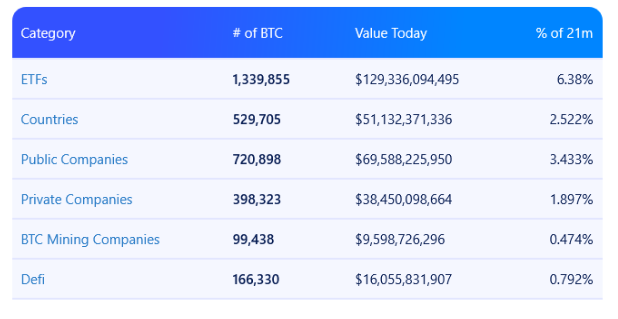When companies hold cash on their balance sheets, that capital is typically stashed in bank accounts or short-term Treasuries – assets that are essentially guaranteed to not lose value.
Consider the staggering $334.2 billion with which Warren Buffett’s Berskhire Hathaway (NYSE: BRK.B) concluded 2024. It’s marked in T-bills, making the conglomerate one of the largest holders of U.S. government debt in the world. Point is a company’s treasury reserves usually don’t do much in terms of creating value for the firm and its investors until the cash is deployed.
Point #2: there was time when holding bitcoin on a corporate balance sheet was unthinkable. It was too volatile and had limited use cases, claimed the critics. However, as highlighted by the chart below, corporate adoption of bitcoin is now swelling and the newly minted Grayscale Bitcoin Adopters ETF (NYSE: BCOR) taps into that theme.

(Image Courtesy: Bitcoin Treasuries by BitBo)
Indicating that BCOR, which follows the Indxx Bitcoin Adopters Index, could be a well-timed new ETF, the chart indicates that even when stripping out bitcoin miners and ETF sponsors, public and private companies of other stripes own more than 1.1 million bitcoin, or more than 5% of the 21 million limit on bitcoin that will ever exist.
BCOR Basics
One of the big reasons corporate adoption of bitcoin is increasing is because of accounting treatment. Previously, companies that held the largest cryptocurrency on their books had to treat those holdings as intangible assets. With ASU 2023-08, the Financial Accounting Standards Board (FASB).
In other words, corporate ownership of bitcoin is now more attractive from an accounting stand point. Obviously, that adds to the digital currency’s adoption case and that’s good for HODLers of all types.
“The adoption of Bitcoin for use as a treasury reserve asset is symbolic of the innovative nature of companies that tends to lead to industry leadership. The companies represented in BCOR are united by the growing theme of corporate adoption of Bitcoin,” according to Grayscale.
Beyond the potential for price appreciation, companies have compelling reasons to establish bitcoin reserves. Making such a move diversifies a firm’s liquid assets while potentially improving risk management. Not only that, but like any other cash holder, a company’s cash reserves lose purchasing power when inflation increases. Bitcoin can guard against that.
More BCOR Details
It’s important to note that BCOR has standards and it is sector and geographically agnostic. The new ETF’s holdings hail from seven of the 11 GICS sectors with 15 industries represented.
“BCOR focuses on companies early in their Bitcoin treasury adoption lifecycle, setting a minimum number of Bitcoins owned to 100. Additionally, BCOR deploys a weighting scheme that considers company size and prioritizes companies outside of the Bitcoin mining ecosystem,” adds the issuer.
Not surprisingly, Strategy (NASDAQ: MSTR) is BCOR’s largest holding, accounting for almost 26% of the ETF’s roster. Tesla (NASDAQ: TSLA) and MercadoLibre (NASDAQ: MELI) – often considered the Amazon of Latin America – combine for almost 22% of the BCOR portfolio. Other familiar names in the ETF include Coinbase (NASDAQ: COIN) and Block (NYSE: XYZ).


